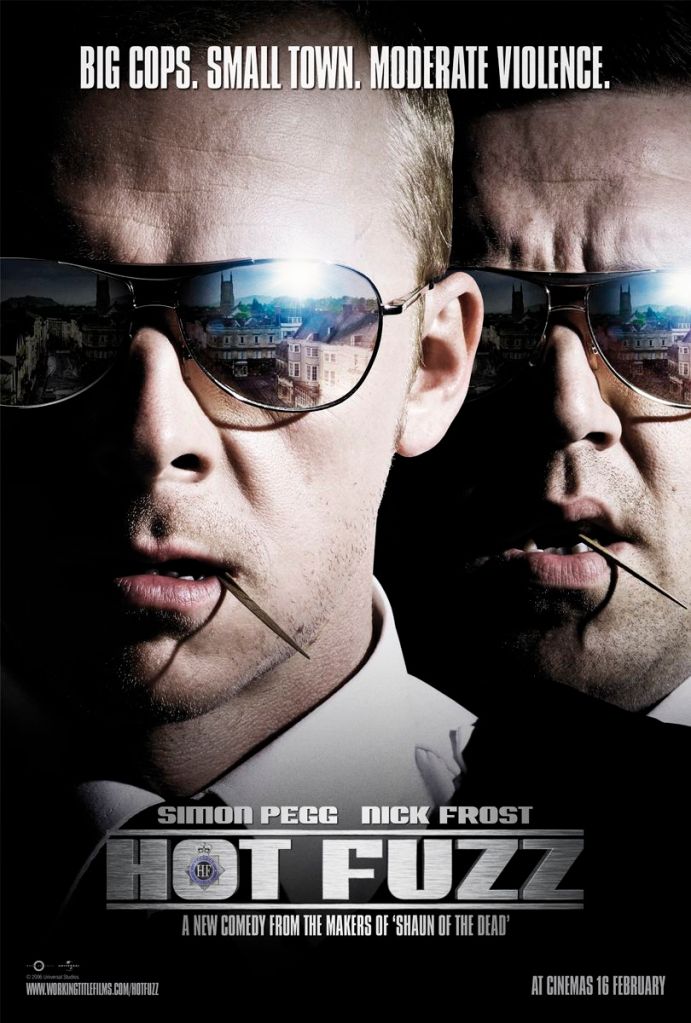Personal growth has been the subject of director Edgar Wright’s fascination ever since his breakout feature, Shaun of the Dead, wowed critics and gained a cult following among zombie-movie fans and comedy nerds. His follow-ups to that film, Hot Fuzz and The World’s End, form the basis of his loose thematic “Cornetto Trilogy.” All three star Simon Pegg and Nick Frost and have all traced the emotional contours of a generation of men perpetually stuck in adolescence, their heads in the clouds of an endless stream of pop culture doing battle with the responsibilities of a working life.
Shaun of the Dead and The World’s End wrestle with deep emotional pain in a surprisingly honest way, tackling romance and friendship with more subtlety than many dramas. Then there’s Hot Fuzz, now ten years old, sitting between the two, playing with those same themes, but making them second fiddle to an almost extreme barrage of jokes, gags, and movie references. The movie is absolutely content to be what it is on its surface: an incredible send-up of the action genre which also happens to be a great entry in that genre. Funniest of all is that, despite allowing itself to be more shallow, Hot Fuzz stands quite easily as the best of the Cornetto films.
Videos by VICE
Looking back at Hot Fuzz, the film occupies a curious place in the 2007 comedy landscape—a year that also included the Knocked Up, Superbad, Juno, Hot Rod, Walk Hard, and more. With his elaborately plotted and edited action-comedy, Edgar Wright balances the spoof with something greater. The long, climactic series of action sequences occur in the film’s final act can be placed right alongside many of the era’s best action films for sheer thrill. That sets the film apart from the more typical range of comedies of the time, and even above a film like The Heat, which features even more action, but none of it compellingly shot.
It’s the technical qualities of Wright’s filmmaking that stand above. There’s nothing loose about his films and not a moment wasted. They are tightly wound, tightly edited blasts of comedy drawn from a Tarantino-like affection for films and filmmakers of the past. And while the modern milieu of improv-inspired comedy films has shown no signs of slowing down over the past ten years, Wright’s intricately orchestrated approach is as rare as ever. His jokes are constructed with precision timing, and often the editing itself is the joke, like when the main characters stop a speeding driver after only a few feet of chase, done with all the intensity of a Michael Bay film. Few other directors can so ably fit so many cuts into only a few seconds and make it all legible to the viewer.
Wright doesn’t just outclass other directors, but with Hot Fuzz he outdoes himself. Shaun of the Dead, his zombie movie parody, has the shape of a romantic comedy, with a warmth and a degree of seriousness. It’s a great film, truly one of the best comedies of the 2000s, but sitting next to Hot Fuzz, and given Wright’s chops, it feels somehow too small, too contained. On the other side, there’s The World’s End, an apocalyptic body-snatching film that gives Wright all the technical space to go nuts and a sharper dramatic story of a man incapable of growing up, to the point that it’s destroying his life. The film is a culmination, but it’s also a touch too in awe of its own emotional ambitions and ultimately confused about its purpose. It’s a comedy with something to say about maturation, but exactly what that something might be is elusive.
Hot Fuzz, meanwhile, takes all the filmmaking prowess present in Shaun of the Dead, ups everything in scale without missing a beat, and then recognizes that it can’t possibly replicate Shaun‘s emotional heft, going instead for all out laughs. And the laughs don’t stop. From its opening shot of Simon Pegg slowly and intensely marching toward the camera, Hot Fuzz bombards the audiences with so many jokes and sight-gags that even ten years later you’re bound to find new things to laugh at. So many jokes can indeed be overwhelming, making whatever drama that draws the audience in feel incidental, eventually losing their sense that anything in the film matters well before its grand finale. But Wright so smartly plots his film, fitting in emotional beats at just the right moments and unweaving a Wicker Man-esque plot of British horror intrigue with such fine detail. This allows rewatches to reveal hilarious, impressive bits of foreshadowing.
If any criticism can be leveled against Hot Fuzz, it’s that it’s too perfect. The technical precision in scripting, shooting, and editing has the potential to read as cold, a little too robotic. Wright avoids going over that line, though, through the force of his own good nature. Amid all the bombast and tight editing, the film still features the same small-town core at the heart of Shaun of the Dead. It’s what makes Wright’s film so appealing, really: grand genre experiments and send-ups of our favorite movies, made by that fun kid who lived down the road and had a wall of VHS tapes at home. There’s a soul in his films. While Hot Fuzz lets itself get carried away by parody more than his other movies, it’s all motivated by the same sense of love, making it a true pleasure to watch over and over and over and over again, even a whole decade later.
Follow Corey Atad on Twitter.




